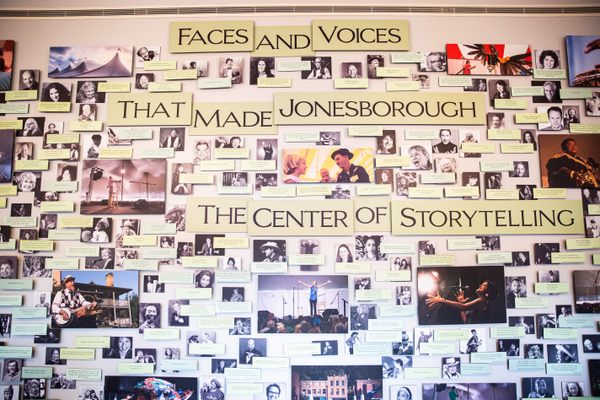Near the end of his oft-bleak history of Appalachia, historian John Alexander Williams cites Jonesborough, Tennessee, as one possible future for the region’s small towns. He specifically calls out Jonesborough as a community that successfully reinvented itself through the preservation of its historic buildings and the escalation of an annual fall festival into the National Storytelling Festival. As Williams tells it, the festival caught tailwinds from a national storytelling revival that was tied to the counterculture’s 1970s shift away from politics toward spirituality and personal growth.
Over that time, the National Storytelling Festival grew from attracting a few dozen people in 1973 to more than 10,000 annually by the end of the ’90s. During the festival weekend in October, circus tents are hoisted at various points in the town where people gather to hear a wide range of storytellers, including both first-time amateurs and professionals who make a living speaking at a circuit of K-12 schools, libraries, universities and other festivals. Some fans follow specific storytellers around the festival, while others pick one tent and stay there.
The festival is hosted by the International Storytelling Center, which operates during regular hours throughout the week. Although the festival is clearly the center’s premier event, it hosts storytelling events throughout the year.
The International Storytelling Center features storytellers from around the world. Motoko, Maria Menzies, Bobby Norfolk and Pete Seeger are among the individuals who appear on the center’s wall of storytellers, located just outside its main theater. But it takes pains to spotlight Appalachian storytellers like Sheila Kay Adams and Bil Lepp. In December, Michael Reno Harrell and Josh Goforth, both of western North Carolina, played a set of Christmas tunes interspersed with stories about their memories growing up.
“Our most popular storytellers are Appalachian, but we bring people a lot of other storytellers who tell African-American stories, or Anne Shimojima, who talks about her family‘s incarceration in Japanese camps in the United States,” says Angela White, a spokeswoman for the center. “There’s room for everyone on that spectrum of storytelling, so we have the stereotypical Appalachian, but we also have a little bit of everything else.”
The center largely is dedicated to venue space for events, but also is worth visiting for its storytelling wall, a collage of images and quotations from the many storytellers who have visited Jonesborough. The gift shop also carries an array of books, T-shirts and other items based around storytelling in Appalachia and beyond. The center is located in Jonesborough’s historic district, which includes numerous other buildings of note, including the Chester Inn State Historic Site and Museum next door.

